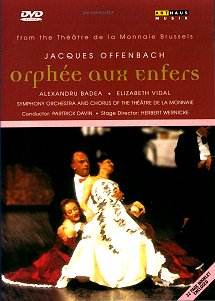Satire is a funny game. Offenbach’s parody of Napoleonic
society and its social injustices uses figures from Classical mythology
to render the comedy and comment at one remove, a trick pioneered by
Aristophanes and used frequently during the intervening space of (approximately)
2368 years. Orphée’s success led Napoleon himself to order a
Command Performance of the piece 18 months later, which is rather like
The Queen inviting the Sex Pistols to a Royal Variety Show.
The tableau gradually revealed during the Overture
leads the viewer to suppose that a recognisable reflection of that satiric
intent is about to unfold: Classical scenes of disporting deities are
revealed, but there’s something wrong: the paintings are third-rate,
and they are peeling off the walls. This is a nice idea which puts the
viewer in house and distracts from the scrappy playing and sluggish
conducting in the pit, where the camera is usually trained during these
opera-on-film productions.
The Bizarreries only start when Public Opinion is revealed
not on stage but haranguing her way through the stalls, a French Nora
Batty in appearance and vocal quality. If it’s put on, it still sounds
dreadful. The production’s one estimable advantage soon appears, an
Orpheus who can actually play the fiddle as opposed to the lame mugging
often seen on stage. In fact Badea’s skills on the violin are superior
to those of his voice, which proves dry and rather inflexible. Mind
you, one can only sympathise when Eurydice, driven to despair by her
husband’s violinistic soliloquies, exclaims ‘Ah, how dreary and irritating!’
The fault here lies less with Orpheus or Badea than with Offenbach,
in one of the several musically thin moments (sometimes five-minute
spans) in the piece.
But there’s also fizz and fun in Offenbach’s score,
so long as the conductor and director are willing to share the joke.
They aren’t here. Tempos stay flat, and when they speed up from time
to time, cracks show in the ensemble large enough to demonstrate why
they slow down again. Act 2 is set on Mount Olympus but in Herbert Wernicke’s
vision, the gods loll about in the ‘Mort Subite’ café, wherein
the action of the whole opera takes place. Perhaps the geographical
transference pokes fun at the dinner-jacketed and degenerate upper classes
(even those who go to the opera, bit of cutting social criticism there)
of our age and of Offenbach’s. I thought, perhaps naively, that one
of the first rules of drama was that the characters have to appear interested
in what they are doing for the audience to share the feeling. Everyone
looks so catatonically bored that it required an effort of will not
to put them out of their misery and press the ‘Eject’ button. Maybe
the entry of Mercury, winged messenger of the gods, through the café
roof was meant to reduce me to helpless laughter, or maybe it was his
continual failure to sing on the beat. Constant stage business renders
absurd the few moments of lyric tenderness; while Eurydice sings her
farewell to earth, Pluto slathers on panstick to make himself up as
a comedy devil. Orpheus’s brief song of triumph is subverted by Public
Opinion stumbling along the front row of the stalls and treading on
the toes of a few Brussels opera-goers en route. It’s not funny, and
it has precious little to do with Offenbach. In such circumstances it’s
no wonder there are no very distinguished vocal contributions, though
Elisabeth Vidal’s Eurydice is brightly sung. The opera’s famous closing
Can-Can bowls along, as it should, with a slight sense of hysteria that
suggests either another po-mo piece of subversion or relief on the performers’
part that they have got this far.
May I suggest that the senses of humour possessed by
the French and the Germans are not entirely complementary? My apologies
to those who regard such comment as a slur on either nation, but I posit
it as one possible reason among many to account for this turgid travesty
of a night at the Brussels Opera.
Peter Quantrill


